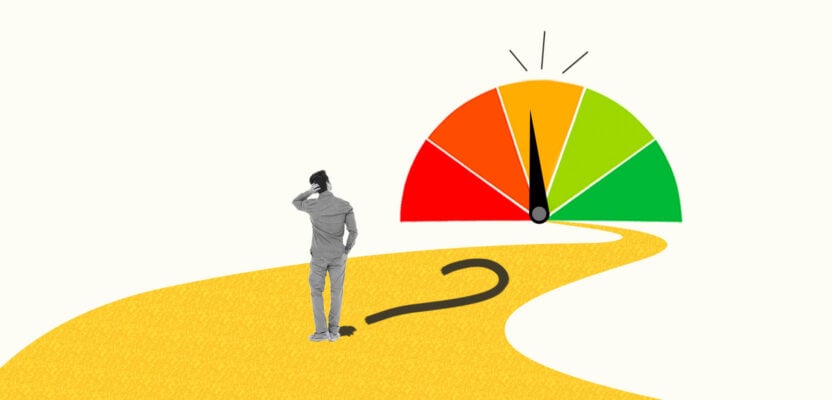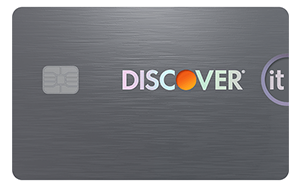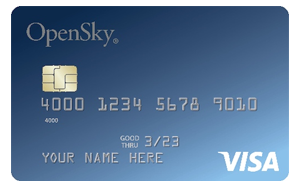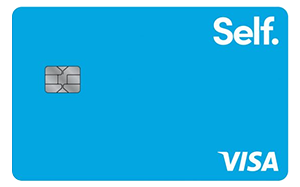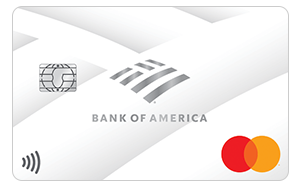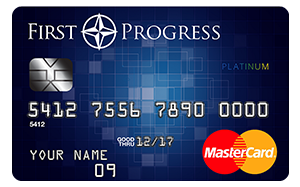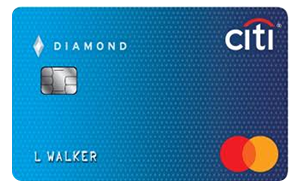If you’ve checked your credit score recently and found out that your score is considered “fair,” you’re probably wondering what exactly that means. How does your credit score compare to the average, and more importantly, what kinds of credit cards and loans does it qualify you for?
The truth is that a fair credit score is slightly below the national average, although it’s not so low that it will seriously interfere with your life. We’ll break down exactly what your credit score means and what you can do to improve it.
Table of Contents
What does it mean to have fair credit?
If you have fair credit, it means that your credit score falls roughly in the middle of the credit score range in the scoring model that you checked. There are two popular credit scoring companies in the US, FICO and VantageScore, and credit scores in both models range from 300 (the worst score possible) to 850 (the best).
In each model, a fair credit score is one that falls between:
Scores in these ranges aren’t terrible, but they aren’t very good, either.
With a fair credit score, you’ll be able to qualify for most types of credit, such as credit cards, auto loans, and mortgages. However, you won’t be eligible for very good terms (e.g., cashback rewards on credit cards and low interest rates).
Putting your fair credit score into context
The graphs below show where your fair credit score falls on FICO and VantageScore’s 300–850 scale:
FICO Credit Score Classifications

VantageScore Credit Score Classifications

As you can see, in both models, fair credit scores fall near the middle of the scale, between the “good” and “poor” ranges. This matches how most lenders see them—not great, not terrible.
It’s important to note that the numbers given above are just rough guidelines. Lenders have their own definitions of what they consider a fair or good credit score. When you apply for credit, your lender’s individual standards are more important than how FICO (or any other model) classifies your score.
However, most lenders don’t publicize their credit scoring requirements, so it still makes sense to pay attention to FICO’s classifications.
More lenders use FICO than VantageScore
If you checked your score on a credit monitoring site, such as CreditKarma, you probably saw your VantageScore. While many consumer-facing credit monitoring services provide these scores, the majority of lenders use FICO in their lending decisions, so your FICO score is much more important. You may be able to check your FICO score through your bank’s online portal.
Is a fair credit score the same as an average credit score?
No, having fair credit isn’t the same as having average credit. Fair credit scores are slightly below average.
The average credit score in the US stands at 716 for FICO scores and 695 for VantageScores. That falls into the “good” range in both models.
Fair credit scores are sometimes referred to as ”average” because they’re neither particularly good nor bad, but because the average consumer actually has relatively good credit, that isn’t completely accurate.
According to the latest studies, 67% of consumers have a FICO score that falls in the “Good” range or better. In other words, having a fair credit score places you in the bottom third of borrowers in the country.
What’s the difference between fair credit and good credit?
Obviously, a fair credit score is slightly worse than a good credit score. Having a fair credit score is enough to qualify for most types of credit accounts, but a good credit score is necessary to get credit with favorable terms.
In FICO’s model, good credit scores begin at 670. Once you pass that point, you’ll find it much easier to get credit cards and loans with low interest rates, minimal fees, lucrative rewards, etc.
Additionally, once you have a good credit score, you’ll be in better shape if you have to:
- Pass an employer’s background check: Some employers run credit checks on job applicants. A fair credit score might be enough to pass a background check, but a good score almost certainly will be.
- Apply for an apartment: Many landlords also run credit checks on their prospective tenants. Many landlords and property managers want to see a score of at least 620, but some (especially ones attached to large property management companies) will want to see a good credit score before they’ll rent to you.
- Sign a utility or phone contract: If your credit score is relatively low (especially if it’s below 600), utility and cell phone companies may require you to pay a security deposit before they’ll provide service to you. With a higher credit score, they’ll drop this requirement.
- Get insurance: Insurers often look at your credit when deciding how much to charge you each month for insurance. If you have good credit, you’ll be able to get a better deal on health insurance or home insurance.
Why do you have a fair credit score?
There are three potential reasons why your score is a bit below average:
- You have a short credit history: If you haven’t been using credit for long, you have what’s called a “thin credit file”—one that just doesn’t contain very much history yet. If so, it makes sense that you have fair credit instead of an excellent credit score. You haven’t done anything wrong; building credit just takes time.
- You’re using too much credit: Both credit scoring models measure your credit utilization, which is the amount of your credit that you’re using. It’s best to use less than 30% of your credit, and under 10% is even better. If you’re close to maxing out your credit cards, that’s enough to drop your score from the good range to the fair range.
- You’ve slightly damaged your credit: It’s also possible you’ve incurred derogatory marks (negative items) on your credit report that are hurting your score. Again, a fair credit score isn’t that bad, so these marks probably aren’t very severe. For instance, you might have too many hard inquiries on your credit report, or one or two late payments, but it’s unlikely that you have any serious negative items such as charge-offs (and if you do, they’re probably fairly old).
Whatever your reasons are for having fair credit, it’s worth spending some time improving your credit to try and push your score into the good range. We’ll go over strategies for this at the end of the article.
What are your loans and credit options with a fair credit score?
Your credit and loan options depend on if you’re at the lower or higher portion of the fair credit score range.
- If your score is at the higher end, approaching 670, you may be eligible for many of the same credit accounts as borrowers with genuinely good credit.
- On the other hand, if your score is at the lower end, below 600, you’ll face many of the same problems as someone whose score falls into the sub-580 range.
Read on for a breakdown of your options when it comes to specific types of credit:
Credit cards for fair credit
If your credit score is on the higher end of the fair range, you’ll have a wide range of credit card options, but if your score is closer to 580, getting a decent card may be a struggle.
If you’re in that situation, we recommend looking into secured credit cards. These are cards that require a (refundable) security deposit which your lender will keep if you fail to pay your bills. This reduces risk for your lender, which means these cards are much easier to qualify for than normal unsecured credit cards.
If your credit score isn’t very good, getting a secured card will ensure that you don’t waste your time applying for credit cards you won’t qualify for. Once your score has improved, you can upgrade to an unsecured card.
| Credit Card | Best For | Credit Score | Annual Fee | Welcome Bonus | |
|---|---|---|---|---|---|
| Secured Overall | 300–669 | $0 | Cashback Match | ||
| No Credit Check | 300–669 | $35 | |||
| Beginners | 300–669 | $25 | |||
| No Annual Fee | 300–669 | $0 | |||
| Bad Credit | 300–669 | $49 | |||
| Rebuilding Credit | 300–669 | $0 | |||
| Credit Card | Best For | Credit Score | Annual Fee | Welcome Bonus | |
|---|---|---|---|---|---|
| Bad Credit Overall | 300–669 | $0 | Cashback Match | ||
| Secured | 300–669 | $0 | |||
| Unsecured (No Deposit) | 300–669 | $0 | |||
| No Interest | 300–669 | $0 | |||
| No Credit Check | 300–669 | $35 | |||
| No Fees | 300–669 | $0 | |||
| High Credit Limit | 300–669 | $39 ($0 for the first year if you set up autopay) | |||
| Rewards | 300–669 | $0 | |||
| Building Credit | 580–739 | $0 | |||
Mortgages for fair credit
You can get a mortgage with a fair credit score, but your options depend significantly on what exactly your score is. Many lenders have a minimum credit score required for home loans.
With a score of 580, you can get an FHA loan—a mortgage backed by the Federal Housing Administration—with a down payment of 3.5% or higher. If you can boost your score to 620, you’ll become eligible for a conventional mortgage, at which point your range of choices will open up (not all properties are eligible for FHA loans).
Note that whatever mortgage you get, it will have a higher interest rate than it would have if you had a good credit score.
Your mortgage will probably be the largest loan you’ll take out in your life, so it might be worth delaying for a year or two and making a concerted effort to push your score higher so that you can qualify for a better interest rate. A little hard work and patience now could potentially save you thousands of dollars over the lifetime of your mortgage.
Personal loans for fair credit
It’s possible to get a personal loan with a fair credit score. However, you may have to shop around for a while because some creditors exclusively extend loans to borrowers with good scores, and your options may be limited to personal loans for bad credit. 1
Try calling local credit unions near you. Credit unions sometimes have lower credit score requirements than banks. You’ll also have a better chance if your other metrics of financial health (e.g., your monthly income) are in good shape.
Auto loans for fair credit
It’s possible to get an auto loan no matter what your credit score is—there’s no minimum credit score required to buy a car. The question is what interest rate you’ll qualify for.
There’s a significant difference between taking out a car loan with a fair credit score vs. a good score. According to data from Experian, in 2020, subprime borrowers (with credit scores of 580–619) and near-prime borrowers (620-659) received interest rates of 16.56% and 10.13%, respectively. 2
In contrast, prime borrowers (those with scores of 660 or above, a threshold that’s on the upper end of the fair range) received interest rates of 5.59% on average. As with mortgages, a difference like that can translate to thousands of dollars over the lifetime of a loan.
So if you’re in the market for a car, consider spending some time to boost your credit score beforehand.
How can you improve a fair credit score?
To turn your fair credit score into a good one, follow all the usual advice for building credit. Try these strategies:
Dispute inaccurate items on your credit report
If you have black marks on your credit report, it’s always possible that they were reported by accident. Check for credit accounts and debts that you don’t recognize. If there’s anything on your credit report that shouldn’t be there, you can file a credit dispute to erase the inaccurate item by downloading and sending the letter below.
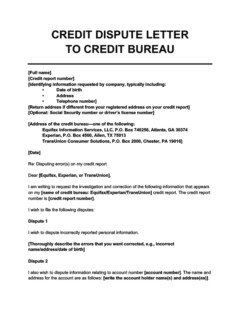
Credit Dispute Letter to a Credit Bureau
Use this credit dispute letter template to file a dispute directly with one of the credit bureaus. Mistakes in your personal information (e.g., an incorrect address), as well as credit accounts that you don't recognize, should usually be disputed with the bureaus. Often they're the result of the bureau confusing you for someone else.
Get a credit-builder loan
Some lenders offer special loans for borrowers who are trying to improve their credit scores. Credit-builder loans are easy to qualify for and will provide a particularly large boost if you have a thin credit file and don’t have any other installment loans (e.g., an auto loan or mortgage) on your credit report.
That’s because one of the factors used to calculate your credit score, referred to as credit mix, rewards you for having a diverse assortment of accounts. If you only have credit cards on your report, adding a loan will give you a significant boost.
To find a credit-builder loan, search for credit unions in your area. Credit unions are more likely to offer relatively niche loans like this than banks.
Get credit for paying your rent and utilities
Rent and utility payments don’t normally appear on your credit report or contribute to your credit score. However, there are services that you can subscribe to, such as Rental Kharma, that will add your bill payments to your report.
These services generally cost money. However, Experian (one of the three main credit bureaus) offers a free service called Experian Boost, which will add your bills to your Experian report. In addition to your rent and utilities, you can also add your other regular bills, including your phone and internet payments.
Boost your credit for FREE with the bills you're already paying

Boost your credit for FREE with the bills you're already paying
- Experian Credit Report and FICO® Score updated every 30 days on sign in
- Instantly increase your credit scores for FREE with Experian Boost™
- Daily Experian credit monitoring and alerts
The improvement you’ll get from adding your bills to your credit report is likely to be relatively small (on the order of 5–10 points). However, because there are many important scoring thresholds within the fair range, there’s a very real chance that those 10 points will mean the difference between qualifying for the credit card you want or not.
Takeaway: Fair credit scores aren’t bad, but they aren’t particularly good, either
- In FICO’s score classifications, fair credit scores fall into a range of 580–669.
- With a fair credit score, you can get most types of credit, such as credit cards and mortgages, but you won’t be eligible for favorable terms.
- If you’re considering taking out a large loan in the near future, you might want to hold off and focus on improving your credit score first.
- To raise your credit score, dispute errors on your credit report, look into credit-building tools (such as credit-builder loans), and add your regular bill payments to your credit report.
